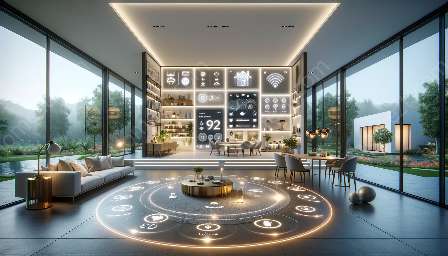Artificial intelligence (AI) has significantly revolutionized various industries, including interior design. The integration of AI in the design process has not only enhanced efficiency and creativity but has also transformed the way we conceive and experience living spaces. This article aims to explore the profound influence of AI on interior design, its compatibility with technological advances, and its role in intelligent home design.
Transformative Impact of AI on Interior Design
The incorporation of AI in interior design has reshaped the industry by offering advanced tools and technologies that streamline the creative process. AI-based software can now analyze complex data, generate detailed simulations, and even recommend personalized design solutions tailored to the preferences and lifestyles of individuals. This level of personalization allows for a more nuanced and empathetic approach to creating living spaces that reflect the unique identity of the inhabitants.
Enhancing Efficiency and Innovation
Technological advances in interior design have been propelled by the capabilities of AI, enabling designers to efficiently iterate through multiple designs, predict trends, and visualize concepts in immersive virtual environments. By harnessing machine learning and predictive analytics, AI has empowered designers to make data-driven decisions, optimize resource utilization, and reduce design errors, ultimately leading to a more streamlined and cost-effective design process.
Intelligent Home Design and AI Integration
The concept of intelligent home design has gained significant traction with the advent of AI-powered smart home systems. These systems leverage AI algorithms to automate various aspects of home management, such as lighting, climate control, and security. Furthermore, AI plays a pivotal role in creating adaptive and responsive environments that learn and adjust to the needs and preferences of the occupants, thereby fostering a harmonious and comfortable living experience.
AI-Powered Personalization in Interior Design
One of the most compelling aspects of AI in interior design is its ability to deliver tailored and personalized solutions. AI algorithms can analyze vast amounts of data related to individual preferences, lifestyle choices, and spatial constraints to generate design options that align with the unique needs of the inhabitants. Moreover, AI-driven personalization extends beyond aesthetics to encompass functionality, ergonomics, and sustainability, thereby optimizing the overall living experience.
Challenges and Opportunities
While AI offers immense potential in revolutionizing interior design, it also presents certain challenges, such as ethical considerations regarding the use of personal data, the need for upskilling designers to effectively utilize AI tools, and ensuring that AI-driven designs uphold the principles of inclusivity and diversity. Nonetheless, these challenges also represent opportunities for the industry to evolve and embrace a human-centric approach to AI integration, thereby fostering a balance between technological innovation and human creativity.
Conclusion
The influence of artificial intelligence on interior design is undeniably transformative, as it continues to redefine the creative process, elevate efficiency, and enable intelligent home design. By embracing the symbiotic relationship between AI, technological advances, and intelligent home design, the industry is poised to create living spaces that are not only aesthetically pleasing but also adaptive, sustainable, and deeply personalized.


